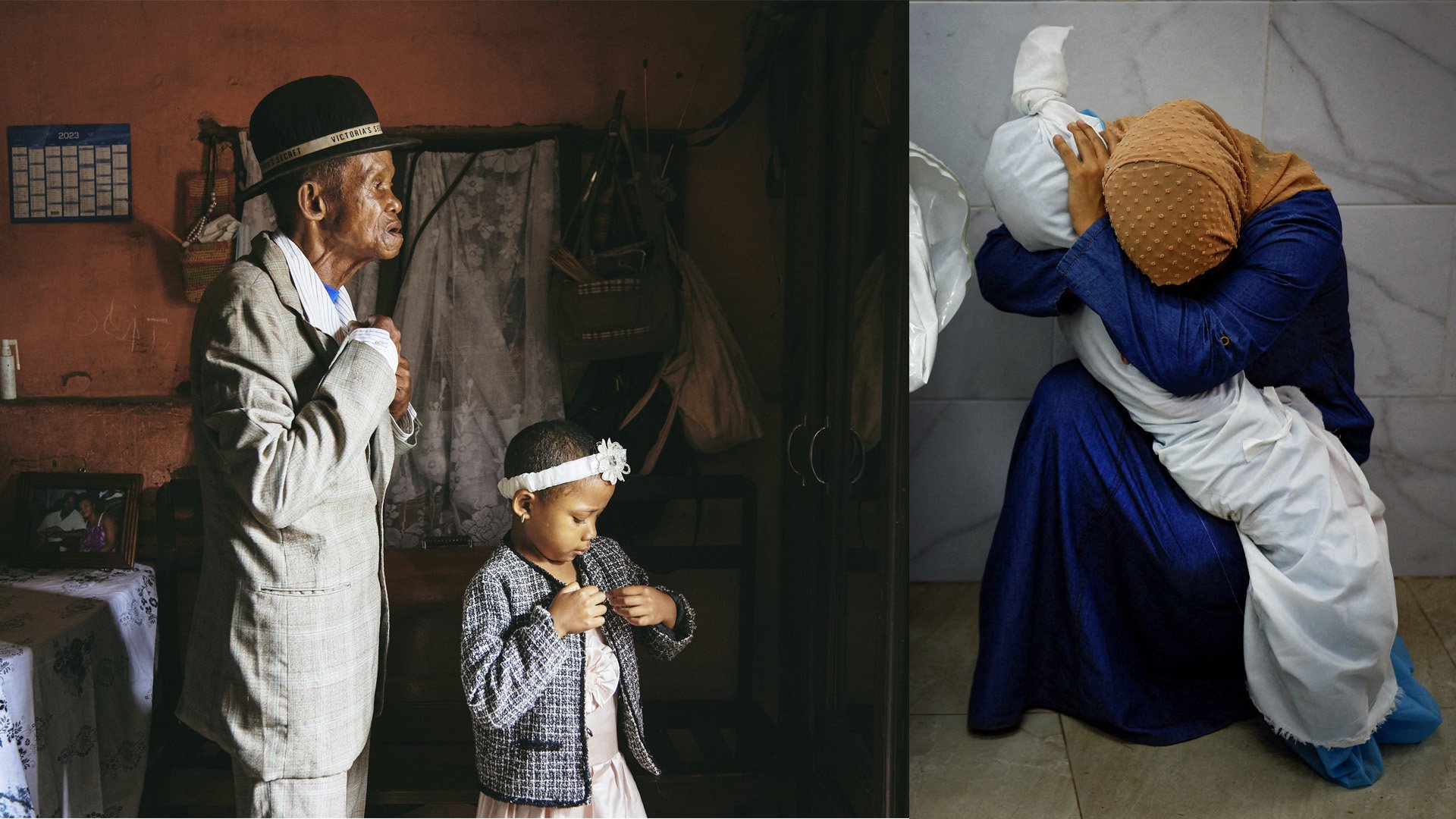

World Press Photo Foundation has announced the 2024 World Press Photo Contest winners. Stories about wars in Gaza and Ukraine, migration, family, and dementia took the first place, telling heartbreaking stories about the important topics.
World Press Photo of the Year
Palestinian photographer Mohammed Salem won the World Press Photo of the Year for a single image. Titled A Palestinian Woman Embraces the Body of Her Niece, the topic of the image is self-explanatory and utterly heartbreaking. Mohammed took the photo just days after his wife gave birth, and he describes it as a “powerful and sad moment that sums up the broader sense of what was happening in the Gaza Strip”.
The jury commented on how the image was composed with care and respect, offering a metaphorical and literal glimpse into unimaginable loss.


World Press Photo Story of the Year
Lee-Ann Olwage from South Africa won first place for the World Press Photo Story of the Year. Lee-Ann’s series Valim-babena follows “Dada Paul” and his granddaughter Odliatemix. He has lived with dementia for 11 years, and his daughter Fara takes care of him.
“In Madagascar, lack of public awareness surrounding dementia means that people displaying symptoms of memory loss are often stigmatized,” the photographer explains. This story is part of Lee-Ann’s longer-term body of work about dementia.
The jury commented:
“This story tackles a universal health issue through the lens of family and care. The selection of images are composed with warmth and tenderness reminding viewers of the love and closeness necessary in a time of war and aggression worldwide.”








World Press Photo Long-Term Project Award
Alejandro Cegarra (also here) from Venezuela won the Long-Term Project Award with his project The Two Walls. It tells the story of a significant shift in Mexico’s immigration policies, which started in 2019. Mexico has transformed “from a nation historically open to migrants and asylum seekers at its southern border to a country that enforces stringent immigration policies.”
Alejandro started this project in 2018, drawing from his first-hand experience of migrating from his native Venezuela to Mexico in 2017. Thanks to his own position as a migrant, the jury felt that Alejandro gave a sensitive human-centered perspective that centers on the agency and resilience of migrants.
















World Press Photo Open Format Award
Julia Kochetova from Ukraine won first place in the Open Format Award with her project War Is Personal. This project weaves her photos with poetry, audio clips, and music in collaboration with a Ukrainian illustrator and DJ.
Despite the tens of thousands of civilian and military casualties and the ongoing stalemate, Russia’s war in Ukraine shows no signs of coming to an end. News media outlets continue to update their audiences with statistics and maps, and international attention shifts to other events. Amidst all this, photographers took it upon themselves to create a website that combines photojournalism with the personal diary-style of documentation, providing a glimpse into what it’s like to live in a reality where war is an everyday occurrence.












About press freedom
World Press Photo Foundation emphasizes the importance of press freedom by showcasing some of the world’s best photojournalism and documentary photography, supporting photographers, and introducing visual literacy to a broader audience.
The Foundation notes that over three-quarters of the 99 journalists and media workers who lost their lives globally in 2023 were casualties of the Israel-Gaza conflict. This marks it as one of the deadliest years for journalists, as reported by the Committee to Protect Journalists.
The workplace is often fraught with danger for news photographers. Unlike their colleagues who can report from a distance, photojournalists need to be at the heart of the action. World Press Foundation collaborates with other organizations advocating press freedom to enhance their safety and support.
World Press Photo Exhibition
The World Press Photo Exhibition 2024 will be shown at over 60 locations worldwide, including Amsterdam, London, Berlin, Rome, Mexico City, Rio de Janeiro, Hong Kong, Taipei, Sydney, Toronto, and Tunis. It’s also worth noting that World Press Photo bans AI images in its contest—both generative fill and fully generated images.
Together, these winning images show the importance of press and documentary photography. They’re a testament to the courage, skill, and empathy of photographers worldwide. Make sure to visit the World Press photo’s website to access the full gallery and check out the runner-ups and honorable mentions.
More from World Press Photo






